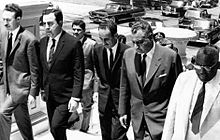Abd ar-Rahman Arif
Haj Abd ar-Rahman Muhammad Arif al-Dschumaili ( English Hajj Abdul Rahman Mohammed Arif Aljumaily , Arabic عبد الرحمن عارف, DMG ʿAbd ar-Raḥman ʿĀrif ; * 1916 in Baghdad ; † August 24, 2007 in Amman ) was an Iraqi army officer and politician. From April 16, 1966 to July 17, 1968 he was President of Iraq and in 1967 briefly in personal union also Prime Minister .
Life
From 1936 Arif had attended the military college in Baghdad and in 1958 took part in the Iraqi revolution together with his younger brother Abd as-Salam Arif and Abd al-Karim Qasim . He was initially dismissed as Brigadier General of the Armored Forces in 1961 . Since Qasim's overthrow by Abd al-Sallam Arif and the Ba'ath Party in 1963, he has held leading army posts again, after the military coup of November 18, 1963 as chief of staff . As his brother's deputy and with the help of the Republican Guards , Arif was able to crush a Nasserist coup attempt in September 1965 , but in April 1966 his brother and president were killed in a helicopter crash, and in July 1966 the Nasserists around Arif Abd ar-Razzaq put on another coup .
The election of Abd al-Rahman as Abd al-Sallam's successor was made at the instigation of the civilian prime minister Abd ar-Rahman al-Bazzaz , but must be viewed as a compromise and emergency solution by rival military officials . Under their pressure, Arif dismissed the civilian prime minister and appointed a military government under Naji Talib , which ended the peace and autonomy negotiations with the Kurds that had been undertaken by Bazzaz .
From May to July 1967, President Arif took over the role of head of government and is thus jointly responsible for the Arab defeat in the Six Day War . The Iraqi Air Force, which rose in time, managed to intercept attacking Israeli fighters, while 50 percent of the Syrian Air Force , 75 percent of the Egyptian Air Force and 90 percent of the Jordanian Air Force were devastated. On the Golan Front, rivalry and distrust between Syrian and Iraqi military led to disaster.
The corruption as well as the discontent of the military and the (since November 1963 opposition) Ba'ath Party could not be mastered, especially since the Arifs were not fundamentally hostile to the Ba''ath Party and therefore behaved inconsistently towards it. The appointment of the ex-Ba'athist Tahir Yahya , on whom his brother had already relied, as premier and the promotion of the loyal Colonel Said Slaibi to general no longer stabilized the Arif regime, and the Republican Guard finally fell away.
On July 17, 1968, Arif was arrested by Ba'ath officers in a coup d'état. A Revolutionary Command Council under ex-Prime Minister Ahmad Hasan al-Bakr took power.
The coup was bloodless. Arif was brought to his house, where the coup plotters had him served a coffee and urged him to rest a little before his flight into exile. The next day Arif said goodbye to the coup plotters with a handshake, wished them success and flew to London.
After several years of asylum in Great Britain, Arif returned to Iraq in 1988 at the invitation of al-Bakr's successor, Saddam Hussein , and received an official's pension in Baghdad. This was also confirmed after the fall of the Baath regime in 2003 by the new Iraqi government installed by the USA, although the aged Arif congratulated Saddam Hussein in the 1995 presidential election and gave this manipulated vote a certain legitimacy through a media-effective handshake.
On August 24, 2007, Arif died at the age of 91 in Amman , Jordan, where he had lived since 2004.
literature
- Marion and Peter Sluglett: Iraq since 1958 - From Revolution to Dictatorship . Suhrkamp Frankfurt 1991
- The International Who's Who 1988-89. Fifty-Second Edition. Europa Publications Limited 1988 London
Web links
- Abdel Rahman Aref , Internationales Biographisches Archiv 37/1969 of September 1, 1969, in the Munzinger archive ( beginning of article freely available)
| personal data | |
|---|---|
| SURNAME | Arif, Abd ar-Rahman |
| ALTERNATIVE NAMES | Arif, Abd ar-Rahman Muhammad (full name); عبد الرحمن عارف (Arabic) |
| BRIEF DESCRIPTION | Iraqi President |
| DATE OF BIRTH | 1916 |
| PLACE OF BIRTH | Baghdad , Iraq |
| DATE OF DEATH | August 24, 2007 |
| Place of death | Amman , Yemen |


